Revell 1/48 B-24D
The Liberator originated from a United States Army Air Corps (USAAC) request in 1938 for Consolidated to produce the B-17 under license, where Consolidated decided instead to submit a more advanced design of its own.
The resulting Model 32 combined designer David R. Davis's high-efficiency airfoil wing, with the twin tail configuration from the Consolidated Model 31 flying boat, together on a new fuselage designed around twin bomb bays, each one being the same size and capacity of the B-17 bomb bays.
The 1939 USAAC Specification C-212 for an intercontinental bomber essentially favored the Model 32, which would be the winning design, the resulting program running under the umbrella group "Project A".
Compared to the B-17, the B-24 had a 6-foot larger wingspan, but a lower wing area, giving it a 35% higher wing loading. The shoulder-mounted high aspect ratio Davis wing allowed a relatively high airspeed and long range.
The Davis wing was also more susceptible to ice formation than contemporary designs, causing distortions of the aerofoil section and resulting in the loss of lift, leading to unpleasant experiences drawing such comments as 'The Davis wing won't hold enough ice to chill your drink'.
The plane featured four supercharged radial engines mounted in cowlings borrowed from the PBY Catalina (except being oval in cross-section, with oil coolers mounted on each side of the engine), turning 3-bladed variable-pitch propellers.
The tailplane featured two large oval vertical stabilizers mounted at the ends of a rectangular horizontal stabilizer, but was very soon recognized that handling and stability could be improved by the use of a single vertical fin. Though the resulting B-24N orders were canceled due to the end of the war, the single fin configuration saw active service with the PB4Y Privateer Naval derivative.
Albeit its bomb bays could accommodate a good 8,000 pounds (3,600 kg) of ordnance, they rarely did, as this decreased range and altitude. Another innovation was the tricycle undercarriage, the first American bomber to do so. It carried a crew of up to ten.
Demanding to fly, with poor low-speed performance, lower ceiling and less robust than the Boeing B-17, it is no surprise that aircrews tended to prefer the latter in the European theater.
The B-24 was used extensively in WWII, with one of its distinctive missions being the well known second attack on Ploiești (Operation Tidal Wave) on 1 August 1943. This was the B-24's most costly mission in terms of aircraft and crew perishing and, combined with the fact that damage to the targets was limited, it is considered a strategic failure.
B-24D-25-CO, s/n 4124225, nicknamed “FLAK ALLEY”, was one of the participating aircraft in Operation Tidal Wave that made it home. She was lost on 24 Feb 44 on her 42nd mission, crashing in a small village south of Gotha, after falling out of formation due to being hit by prop wash, with enemy aircraft finding the chance to concentrate their attacks on it. Of the crew, 6 were killed and 4 were taken POW.
This is the venerable, still nice and still our only quarter scale choice Monogram kit. It was entered in a mini Group with another two wonderful B-24 entries by Wonderful People : @luftwaffe-birdman 's "The Squaw" and @lgardner 's "Tubarao".
Should you wish to read my model's full build review, you may do so by visiting my beloved site Modelingmadness:
https://modelingmadness.com/review/allies/us/usaaf/bombers/pen24.htm
Happy Modelling!
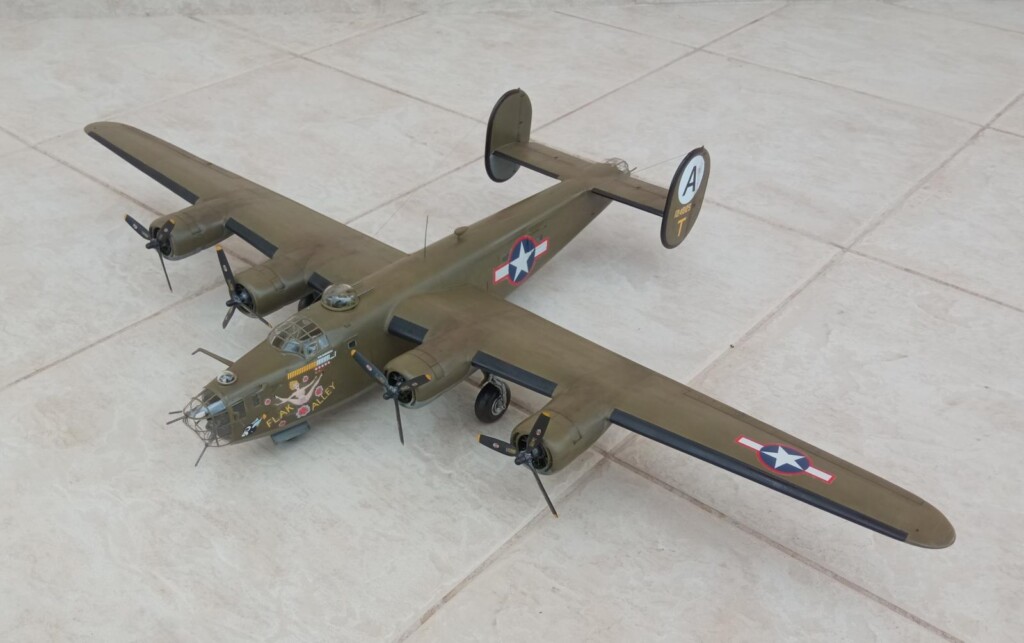

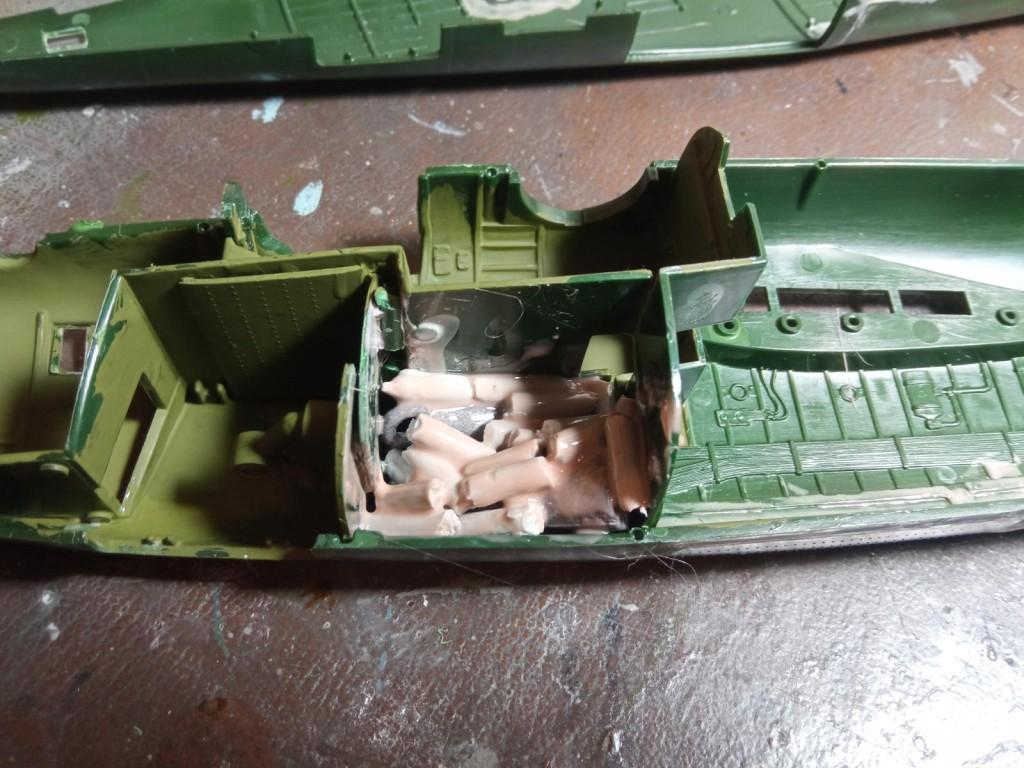
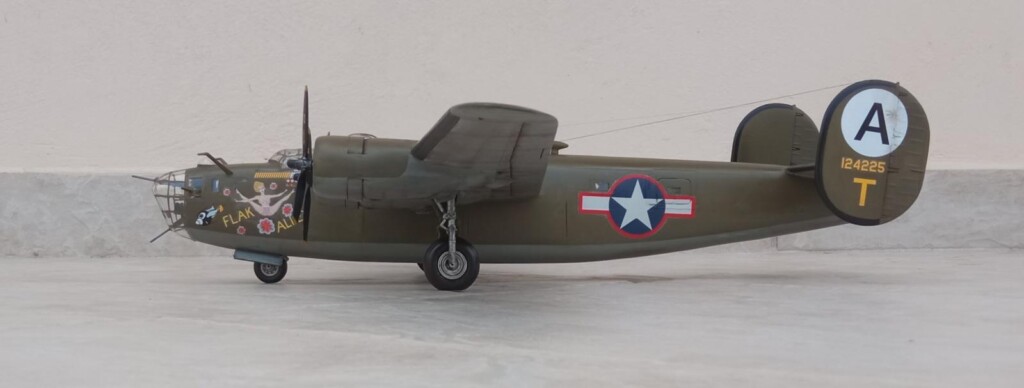
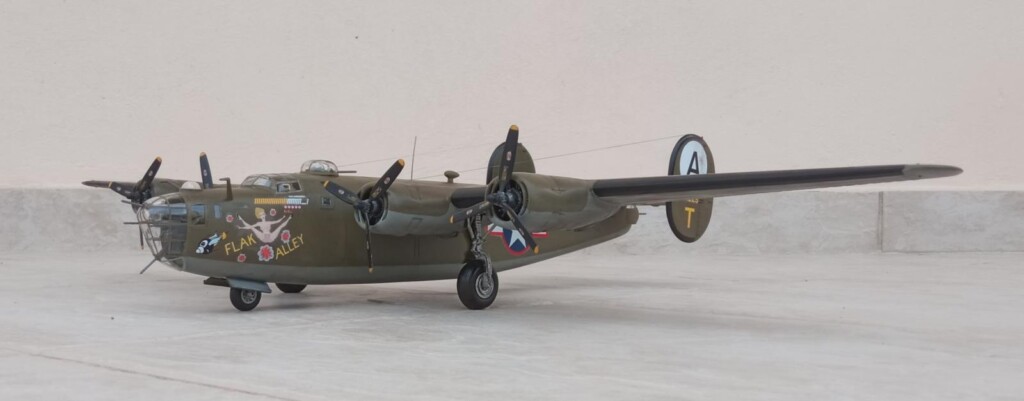
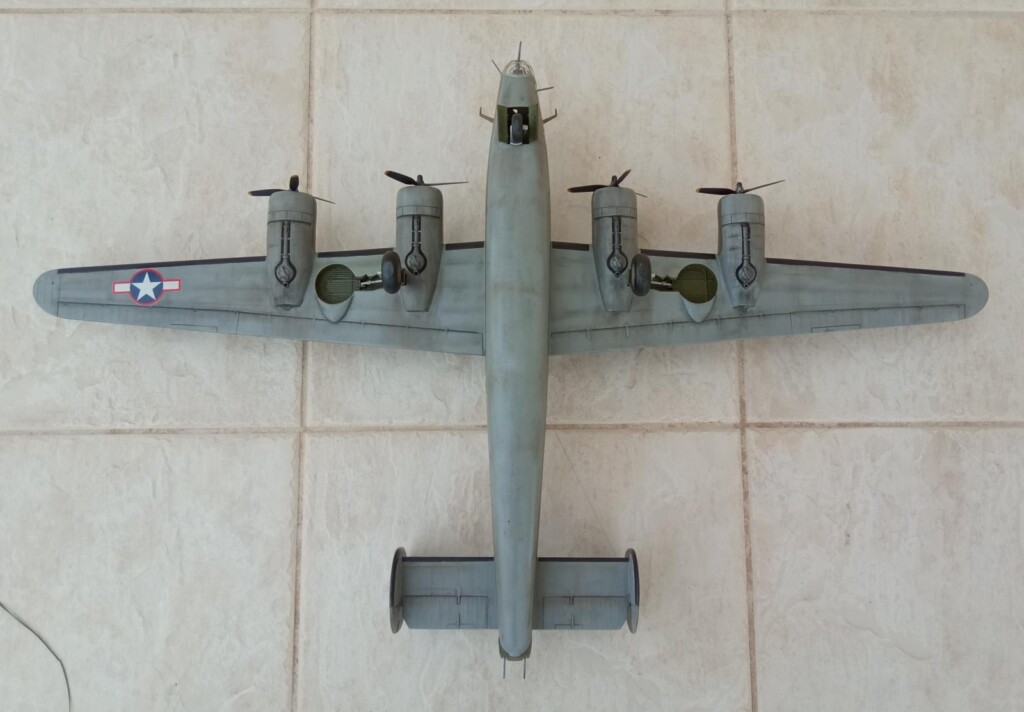

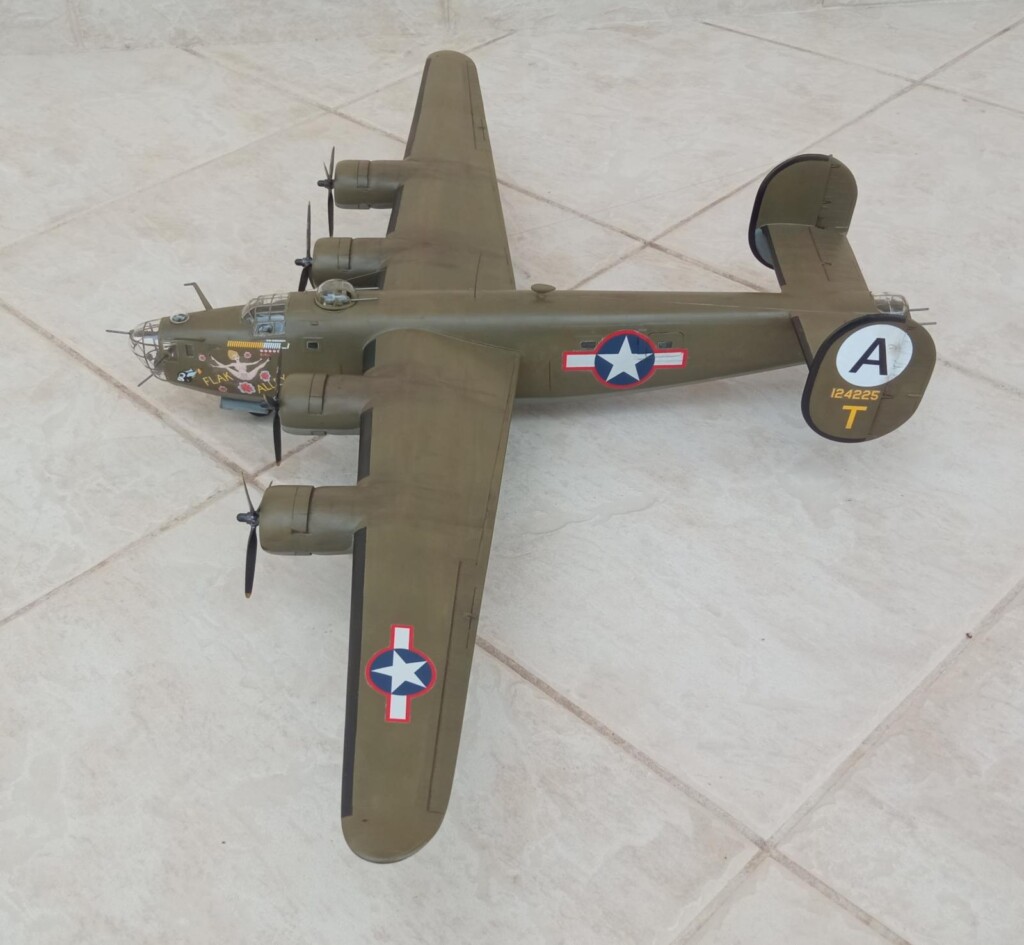
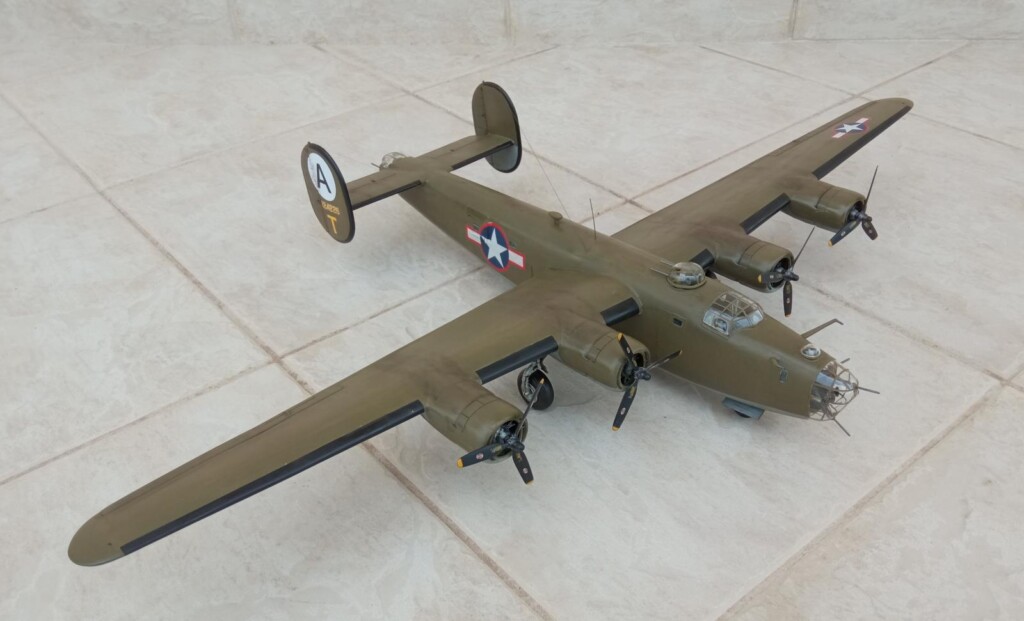

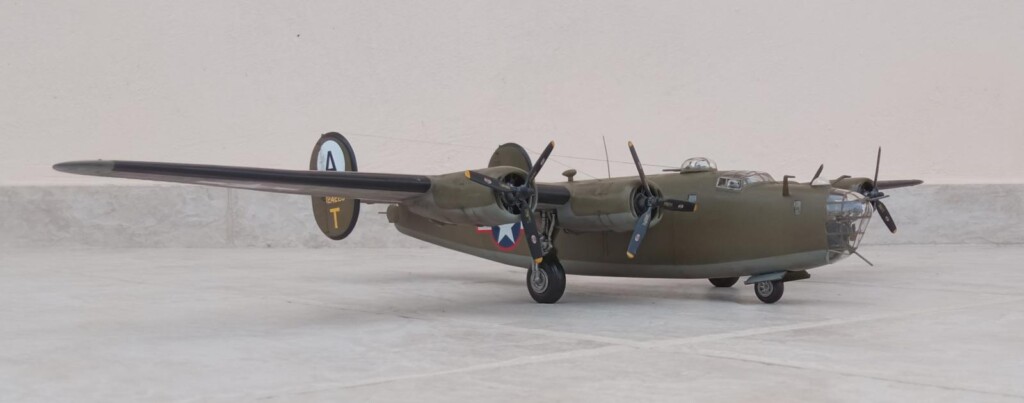
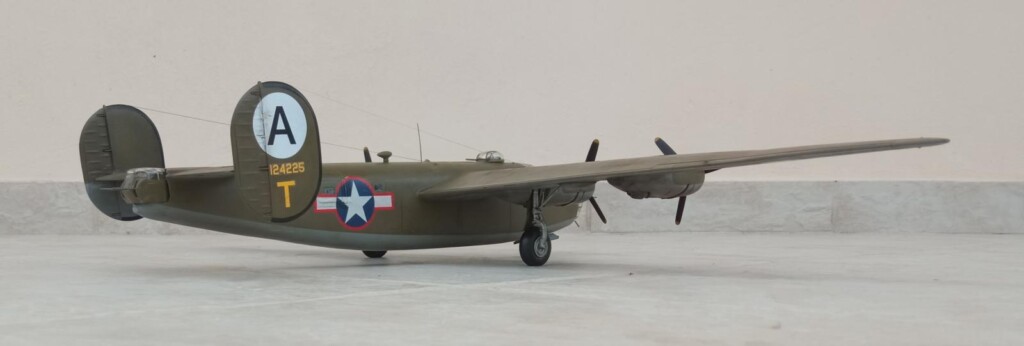
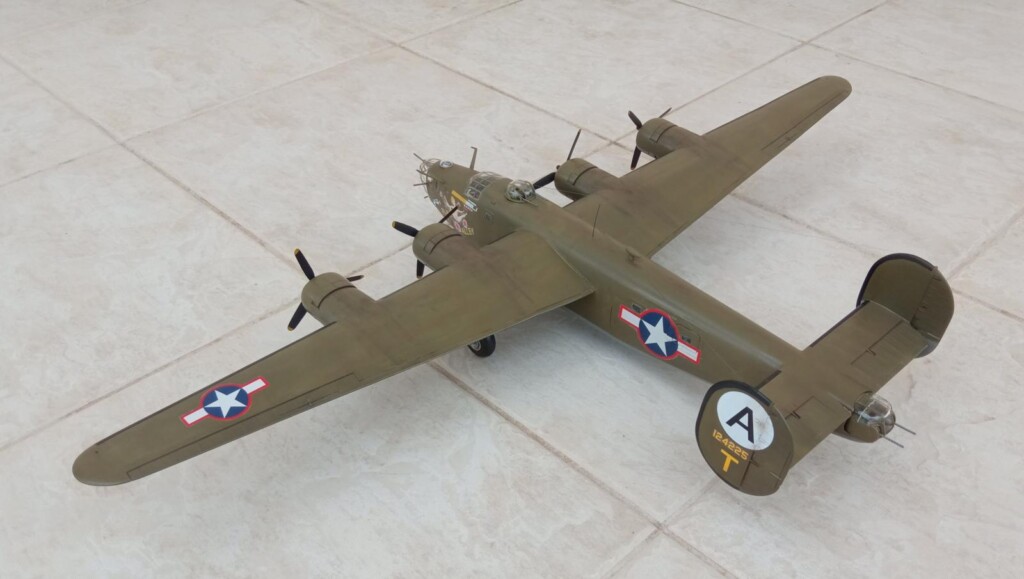
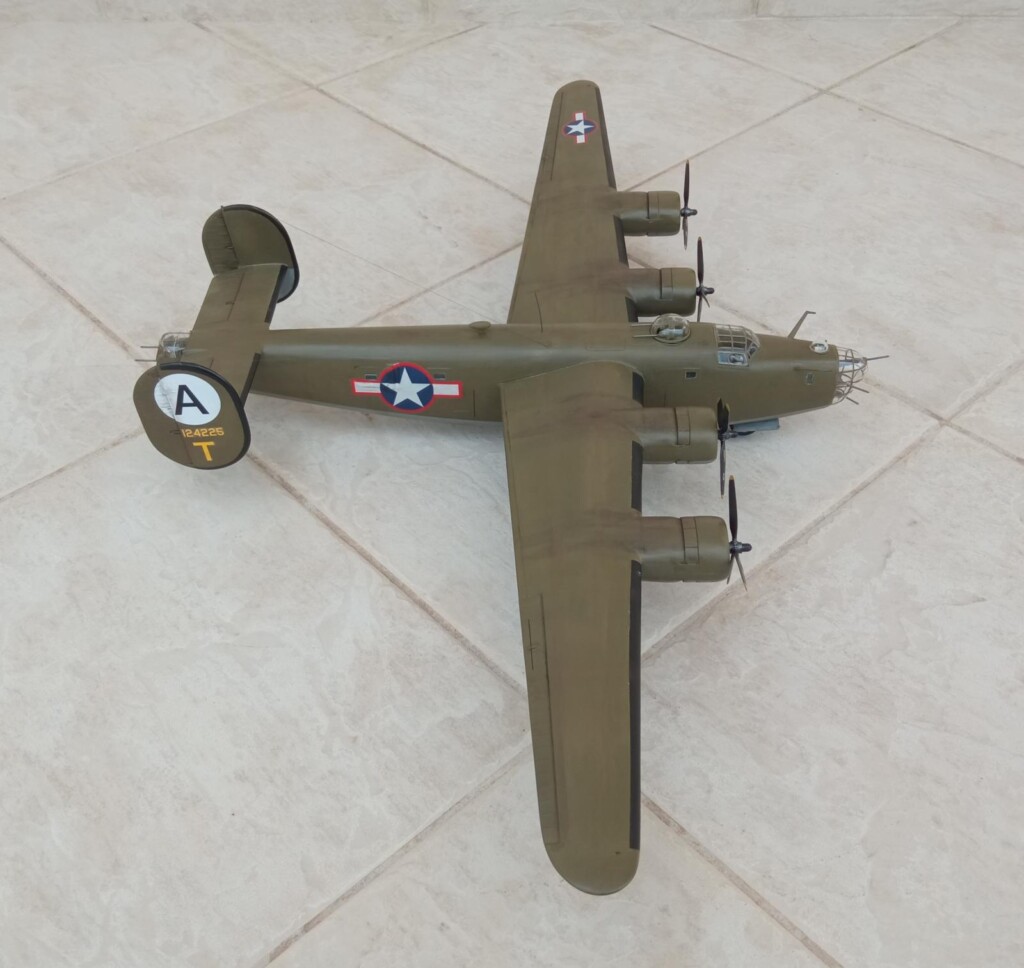
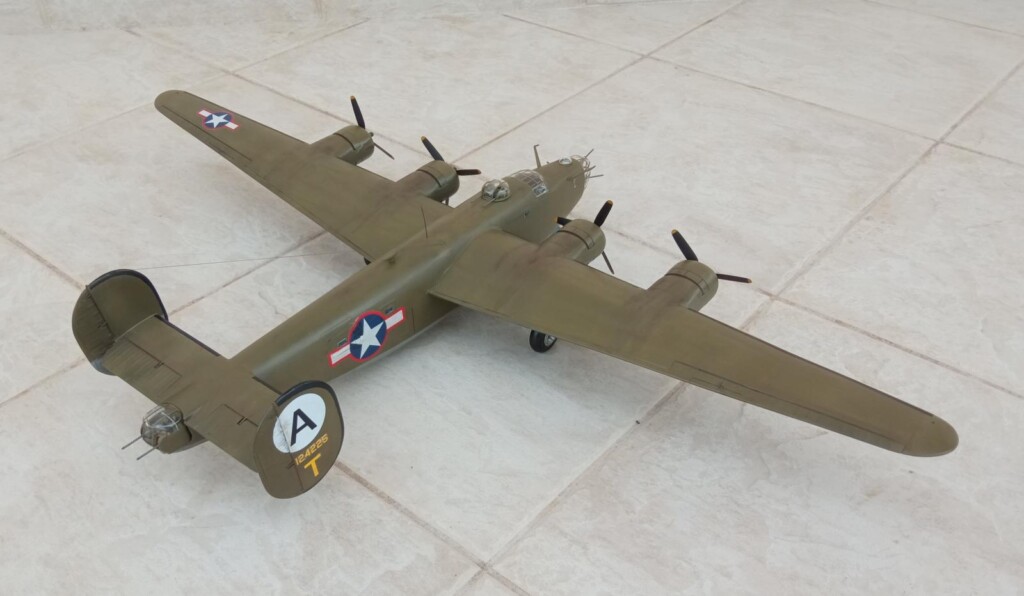
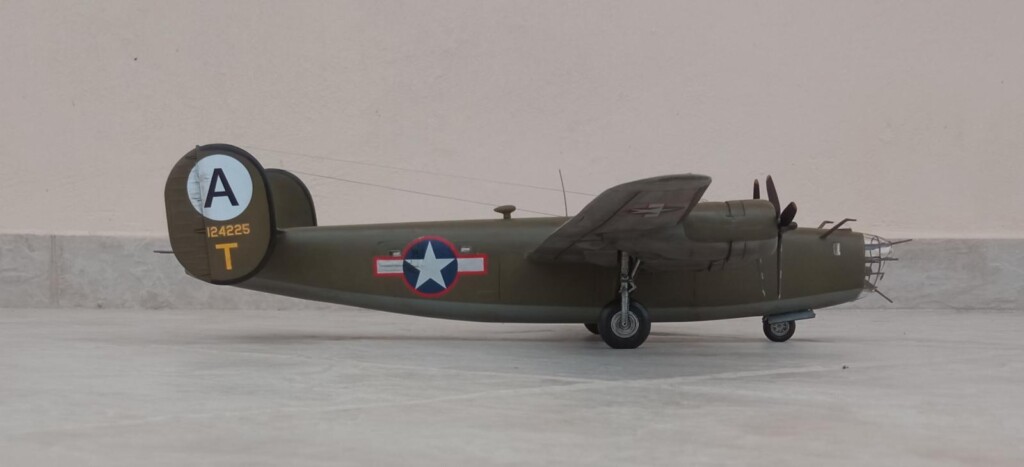
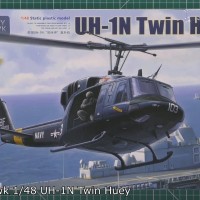
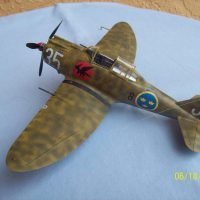
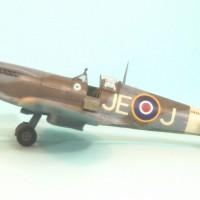
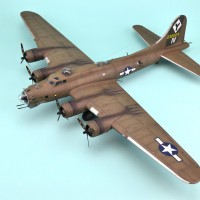
Excellent build Spiros.
Thanks my friend @blackmopane!
Amazing result on this Liberator, Spiros @fiveten
Quite a large aircraft in 1/48 and therefore not easy to handle, but you have proven to deal with it perfectly.
Very nice result and dito article.
Thanks my friend @johnb!
Great build and interesting plane Spiros! Thanks for the history lesson.. I liked how the pics were interspersed in the text.
thanks my friend DJ Fajardo @juan2six!
NICE NICE NICE Spiros! The OD paint job looks great.
Thanks my friend @gwskat!
What a beauty.
Very nicely done Spiros.
She must be a fair size though.
Thanks my friend @alistairfgauld! Yes, she is pretty big!
Hard to beat that kit, whether basically OOB as here, or with the "devotion" @luftwaffe-birdman and @lgardner are showing their projects.
Great result!
Thanks my friend @tcinla! Your build and review at Modelingmadness back in the early 2000s was a milestone in my modeling life.
Nicely done Spiro, IIRC its a pretty tough kit. But who doesn't love 1/48 scale bombers?
Thanks my friend @beauslx!
Well done Spiro, good looking bird.
Thanks my friend @tom-bebout!
I always preferred the B-24 to the B-17 and you've done an excellent job on this old kit. The weathering is particularly realistic and restrained.
Christopher
Thanks my friend @christopher!
Nice work, Spiros. That’s one of the few Monogram kits that I never built.
Thanks my friend @j-healy! Worth a try building one!
Great job, Spiros (@fiveten). I didn't realize you were building a B-24, especially in 1/48. Your really brought out the best in this senior citizen. Well done.
Thanks my friend @gblair!
Well done, my friend Spiros, as we say in cricket, you’ve hit a six with this one. Large aircraft must be tricky to photograph successfully and you’ve managed that as well.
Thanks my friend @chinesegeorge! For taking pics of my bigger models, I have found a suitable spot at my garden and wait for appropriate light conditions.
There is something about Monogram classic kits that where designed with a slide rule, pencil and paper from people who either were one generation removed from the "Best Generation" or they where the Generation. Folks who where closer to the real aircraft. Not an engineering exercise and study in plastic. They had a feel for the look and spirit of the aircraft.
Spiros (@fiveten) a good article and another neat adventure in modeling on doing this classic. Some strong work in the paint dept along with some construction technics that make this O.B build stand out.
Thank you so much my friend @stephen-w-towle. Indeed, classic Monogram kits have their particular and so beloved aura.
Spiros, @fiveten, good to see you put this up on the front page. I enjoyed your build and you really did a nice job out of the box. The kit really does build up to be a good looking kit, and you made the most of it. I want to thank you again here for giving me the left over decals from your kit so that I could build "The Squaw". Thanks Spiros! I will be done with my build soon, a build you made possible.
I hope some people will visit the build blog where they can see how you built your B-24 out of the box, I am building mine using a combination of purchased resin, my own printed resin and scratch building, as well as Louis, @lgardner, doing a lot of scratch building on his B-24. Plus Louis has post a LOT of invaluable reference photos that will be a lot of help to others interested in the B-24. If you are interested you can visit here. https://imodeler.com/groups/work-in-progress-aircraft/forum/topic/monogram-1-48-b-24d-the-squaw-sleepy-but-which-version/
Thank you so much, my friend @luftwaffe-birdman! Your kind invitation to build our B-24s wad what caused my build to materialize. Thank you again! Your Liberator is progressing nicely and it is really supelative!
Hey Spiros, this is a really good looking model. Congratulations! I’d love one day to build a B-24 but will try to show it in flight.
Thanks my friend @marcellorosa1! A Liberator model in flight will be awesome.
This is really great, Spiros! Back in high school I read a book on the Ploesti raid, then built a diorama of Killer Kane's crash-landed B-24 from the Monogram kit (I had the later version with turret on the front, so had to scratch build the glass nose). I didn't realize the planes were green over gray, as you have shown here - I painted mine in desert sand.
Thanks my friend @robgenev665! A number of Ploesti Raid B-24s were indeed painted in desert sand.
Lovely version of this classic Revell big one!
Thanks my friend @grimreaper!
Spiros, this is an awesome build, great looking B-24D.
I remember back in the mid 70's when Monogram started releasing their larger 1/48th muli-engine bombers and C-47...what a time. I still feel even by today's standards that these kits are still great builds. Your skills brought out the best from this kit.
Thanks my friend @v1pro!
Yes, Monogram has to be congratulated for bringing up such wonderful kits. Have already built one C-47, have three more to build!
Great build, and I enjoyed reading the history and background of the B-24D. Thanks for sharing Spiros!
Thanks my friend @jroamer!
A great looking build Spiros @fiveten. Well done!
Thanks my friend @jamesb!
Fantastic build! I love Liberator!
Thanks my friend @lis!
What they said
I like the upper surface fading in particular, subtle yet visible
Thanks my friend @markh!
Spectacular work, Spiros @fiveten. Saw this over at MM too.
Perfect paint job.
Thanks my friend @eb801!
You did a really nice job on this, I like it a lot.
Thanks my friend @gwfabian!
Wow wow wow! You made this old Monogram gem shine in all the right places. Absolutely STUNNING. Well done Spiros!
Thanks so much, my friend @mornem!
Great looking Liberator Spiros! You build so many of those big wing-span birds, surely shelf space is tightening up!?
Thanks my friend @gkittinger! Yep, space is getting less and less, hopefully the Liberator's high mounted wing will host some small 1/72 models under it!
Excellent, Spiros! And what all of the above said. Cool back round info too. Perhaps the wing was less able to absorb damage.@fiveten.
1 attached image. Click to enlarge.
Thanks my friend @roofrat! Great pic, hope the crew managed to bail out...
Great result on this @fiveten Hard work and attention to detail really paid off. Thanks for sharing this classic- bravo!
Thanks my friend @dbutlr!
Very nice build, my friend and love the story... It's those, that give a charachter to the model, I think and the reason why I include them with each and every model of mine.
Thanks my friend @inflames!
Very nice build Spiros, congratulations
Thanks my friend @tolgaul!